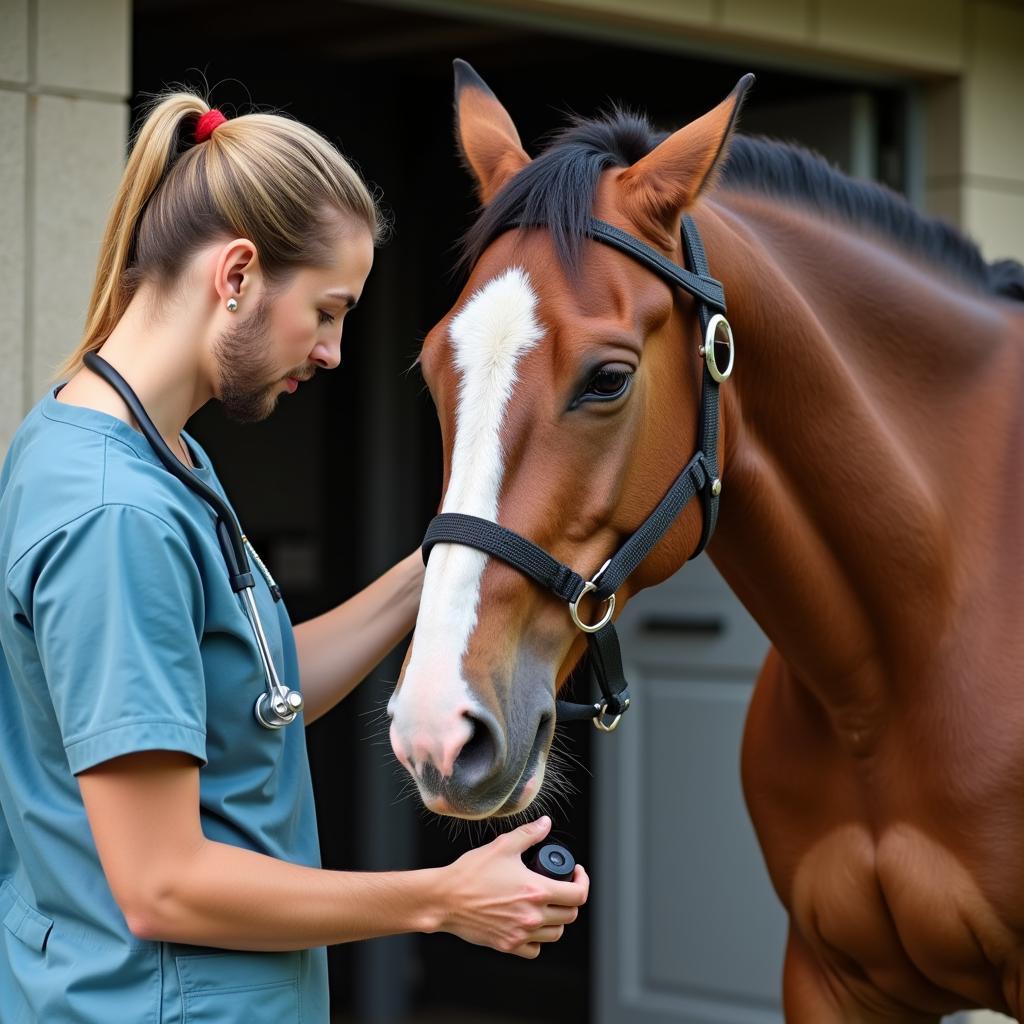Can you ride a 25-year-old horse? The answer isn’t a simple yes or no. A horse’s riding suitability at 25 depends on several factors, including their overall health, fitness level, previous workload, and individual temperament. Just like humans, some horses age gracefully and remain active well into their senior years, while others may experience health issues that limit their ability to be ridden.
Is 25 Old for a Horse?
While 25 is considered senior for a horse, it’s not necessarily the end of their riding career. Many horses can be ridden comfortably into their twenties and even beyond. Think of it like human athletes – some are still competing at high levels in their later years, while others retire earlier. The key is to listen to your horse and prioritize their well-being. A 25-year-old horse might not be suitable for strenuous activities like jumping or barrel racing, but they could be perfect for leisurely trail rides or light dressage work. If you’re considering purchasing a strawberry roan horse for sale, be sure to inquire about their age and riding history.
What to Consider When Riding a Senior Horse
Riding a 25-year-old horse requires a different approach than riding a younger horse. You’ll need to be more mindful of their physical limitations and adjust your expectations accordingly. Here are some key factors to consider:
- Health: Regular veterinary checkups are crucial for senior horses. Conditions like arthritis, Cushing’s disease, and dental problems are more common in older horses and can impact their ability to be ridden.
- Fitness: Just like humans, older horses need regular exercise to maintain muscle tone and flexibility. However, the intensity and duration of their workouts should be adjusted to suit their age and condition. Light riding, lunging, and hand-walking are excellent ways to keep a senior horse fit.
- Warm-up and Cool-down: Proper warm-up and cool-down periods are essential for any horse, but especially for seniors. These periods allow their muscles and joints to prepare for and recover from exercise, reducing the risk of injury.
- Tack and Equipment: Ensure your tack fits correctly and doesn’t cause discomfort. Consider using a thicker saddle pad for extra cushioning.
- Terrain: Choose riding surfaces that are even and forgiving. Avoid rocky or uneven terrain that could strain their joints.
“A well-cared-for senior horse can bring immense joy to their rider,” says Dr. Emily Carter, DVM, specializing in equine geriatric care. “They often possess a calm temperament and years of experience, making them wonderful companions for both experienced and novice riders.”
Signs Your Senior Horse is No Longer Comfortable Being Ridden
It’s important to recognize the signs that your senior horse might be experiencing discomfort or pain while being ridden. These signs can be subtle, so careful observation is crucial.
- Reluctance to move forward: If your horse hesitates or resists moving forward, it could be a sign of pain or stiffness.
- Changes in gait: A shortened stride, stumbling, or an uneven gait can indicate discomfort.
- Behavioral changes: Increased irritability, pinning their ears back, or swishing their tail could be signs of pain.
- Muscle soreness or stiffness: Check for muscle soreness or stiffness after riding.
- Changes in eating habits or weight loss: These can be indicators of underlying health problems.
“It’s always best to err on the side of caution,” advises John Miller, a seasoned horse trainer with over 30 years of experience. “If you suspect your horse is experiencing discomfort, consult with your veterinarian to determine the underlying cause.”
If you are looking for horse-related parts, you can find a wide selection of wheel horse parts at Justus Horses USA. We also have appendix horses for sale if you are looking for a new companion.
 A senior horse receiving veterinary care
A senior horse receiving veterinary care
Caring for a Retired Riding Horse
Even if your 25-year-old horse can no longer be ridden, they can still enjoy a fulfilling life. Providing proper care for a retired riding horse is just as important as caring for a ridden horse. Ensure they receive regular veterinary checkups, a balanced diet, and plenty of opportunities for social interaction and gentle exercise. You might also consider offering them alternative therapies like massage or acupuncture to help manage any age-related discomfort. If you are looking for a dapple gray quarter horse or a kinsky horse, consider visiting Justus Horses USA.
Conclusion
Can you ride a 25-year-old horse? The answer depends on the individual horse. By carefully considering their health, fitness, and temperament, and by paying attention to their signals, you can ensure that your senior horse enjoys a comfortable and fulfilling life, whether it involves riding or simply enjoying their retirement years.
FAQ
- What is the average lifespan of a horse? Horses can live into their late twenties and even thirties.
- How can I tell if my horse is in pain? Look for changes in gait, behavior, and appetite.
- What are some common health problems in senior horses? Arthritis, Cushing’s disease, and dental problems are common.
- What kind of exercise is suitable for a senior horse? Light riding, lunging, and hand-walking are good options.
- How often should a senior horse see a veterinarian? Regular checkups, at least annually, are recommended.
- What should I feed my senior horse? A balanced diet designed for senior horses is important.
- Can a 25-year-old horse still be ridden? It depends on their overall health and fitness.
Need support? Contact us at Phone Number: 0772127271, Email: justushorses@gmail.com or visit us at QGM2+WX2, Vị Trung, Vị Thuỷ, Hậu Giang, Việt Nam. We have a 24/7 customer service team.